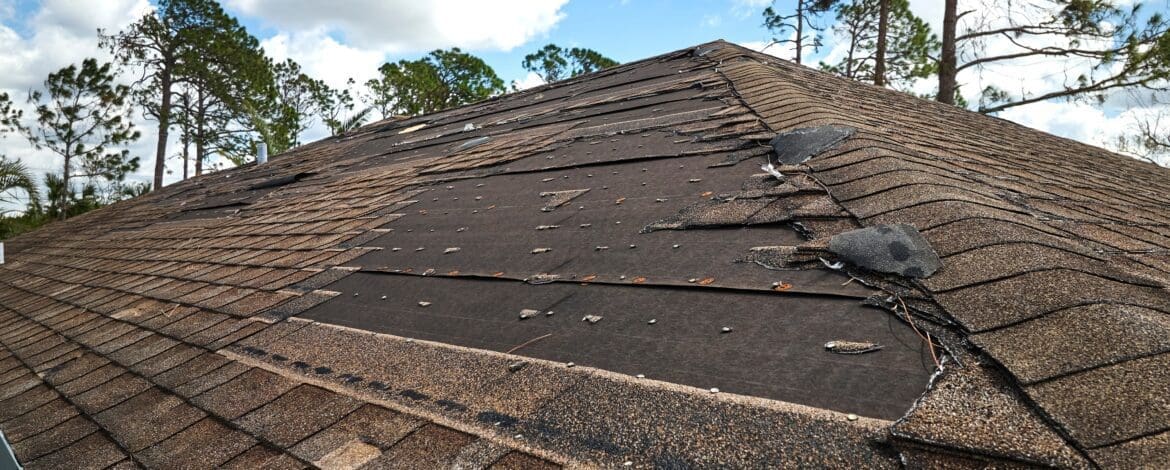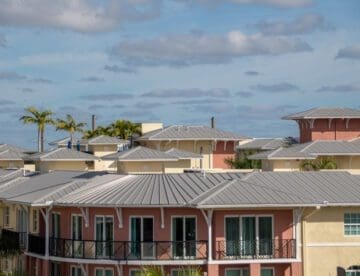Roofing contractors are a part of the larger home construction and remodeling industry that provides homes for families and helps people keep those homes in good repair. The roofing industry in Florida is a sizable market, expected to generate around $4.5 billion in revenue in 2023. The State of Florida regulates all contractors who do anything more than minor work and requires contractors to attain a contractor’s license and business insurance. As such, most contractors have a strong incentive to play by the rules and operate scrupulously. A few, however, do look for victims and try to work various scams. Let’s take a look at how to spot roofing scams.
Licensing
Not all states require contractors to attain licensure, but Florida definitely does. Becoming a Certified Roofing Contractor in Florida requires four years of roofing industry experience, with one year as a supervisor. Alternatively, a four-year degree with one year of relevant experience will also qualify the applicant. Would-be roofing contractors in Florida must pass a five-hour open-book exam of 80 questions. Applicants must also demonstrate their fiscal responsibility and obtain business insurance. These tasks demonstrate specialized roofing industry knowledge, experience, and commitment.
Ultimately it’s up to you as the homeowner to verify that your contractors are licensed and insured. Any contractor who has excuses as to why he can’t provide you with his license information should be disqualified. If you’re working with a lender or insurance company, however, they will definitely require copies of your contractor’s bona fides. Both lenders and insurers will work with you and show you how to spot roofing scams.
Out Of State Vehicle Plates
This is not a definitive clue, but after major storms you’ll often see swarms of work crews in the affected area. This is not necessarily a sign of scams about to happen. Hurricanes result in catastrophic and widespread damage and people need to have their homes repaired as soon as possible. If those contractors and work crews are licensed in Florida and they do good work at fair prices, why shouldn’t they be part of the solution? We’re just saying that you should verify that the contractor is licensed and insured in Florida. The person with the out-of-state plates may simply be a salesperson for the contractor, which leads to the next point.
Storm Chasers
Some firms maintain large crews that “chase” destructive storms. The crews may actually be licensed to work in several states, and they may maintain a large sales staff that works entire neighborhoods and cities at a time. Their goal is to line up multiple jobs in a single neighborhood/town/city. We’re talking dozens of jobs over a few weeks. The crews then come in later and complete those jobs as fast as possible and then move on to the next storm-struck area, which has been pre-sold by the sales staff.
Illegal Offers
In Florida, contractors cannot legally solicit door to door anymore, however. Florida’s Legislature amended some of the language regulating how contractors solicit potential customers in 2022 and 2023. Here are some of the pertinent changes:
“2) A contractor may not directly or indirectly engage in any of the following practices:
(a) Soliciting a residential property owner by means of a prohibited advertisement.
(b) Offering to a residential property owner a rebate, gift, gift card, cash, coupon, waiver of any insurance deductible, or any other thing of value in exchange for:
1. Allowing the contractor to conduct an inspection of the residential property owner’s roof; or
2. Making an insurance claim for damage to the residential property owner’s roof.”
These changes highlight how scammers had previously wrangled roofing jobs by taking advantage of homeowners. Often those were elderly homeowners who weren’t savvy about home repairs, especially after major storms and hurricanes.
Suffice to say, if a contractor offers you anything other than a clear estimate for your new roof, think twice. But the sales staff for storm chasers can simply be present in your neighborhood in their company trucks—without knocking on doors—and people will come out to talk to them.
Pressure to Commit
If you feel pressure to sign a contract that day, or the next day, ask what the hurry is. You might hear explanations about the need to order materials, for example. Take care, and take your time. Would it really derail your roofing project if you took two to three days to think about it? And to look up the roofer’s online presence, if they have one? Also, you should always see proof of licensure IN FLORIDA before signing anything. You should also remember that if you’re working with your insurance company on a claim for a new roof, they will have to send out an adjuster before you’re approved for a new roof. After a major storm, those adjusters will have dozens or even hundreds of claims like yours to work through, and it takes time.
No Website or Online Presence
Any roofing contractor that doesn’t have a top-notch website these days is either hiding something or is completely out of touch. Plenty of contractors still run their day-to-day operations in an analog way with paper forms. That’s fine for them. But if they don’t have a pertinent online presence where you can judge their work as it pertains to your project, I’d say move on to another contractor who’s willing to do the work to meet the public at least halfway. A good website is just basic business these days.
Large Down Payment
This should be a flashing red flag for you. A contractor will have some expenses upfront, so a down payment of 10–30% is reasonable. A larger down payment, say 50% or more, could be a clue that the roofer intends to make off with your money without doing the work.
Let’s Talk About How to Spot Roofing Scams
We sure hope you’ll never be a victim of any scam! But we’ve seen a few and they’re still happening, even with Florida’s new statutes. If we can help advise you on your new roof, and even whether you need a new roof, we’re happy to talk about your situation. Give us a call at 813-373-9088. Our team has more than 40 years of experience in roofing. You can also use this form and mention, “Do I need a new roof?” and we will contact you.



